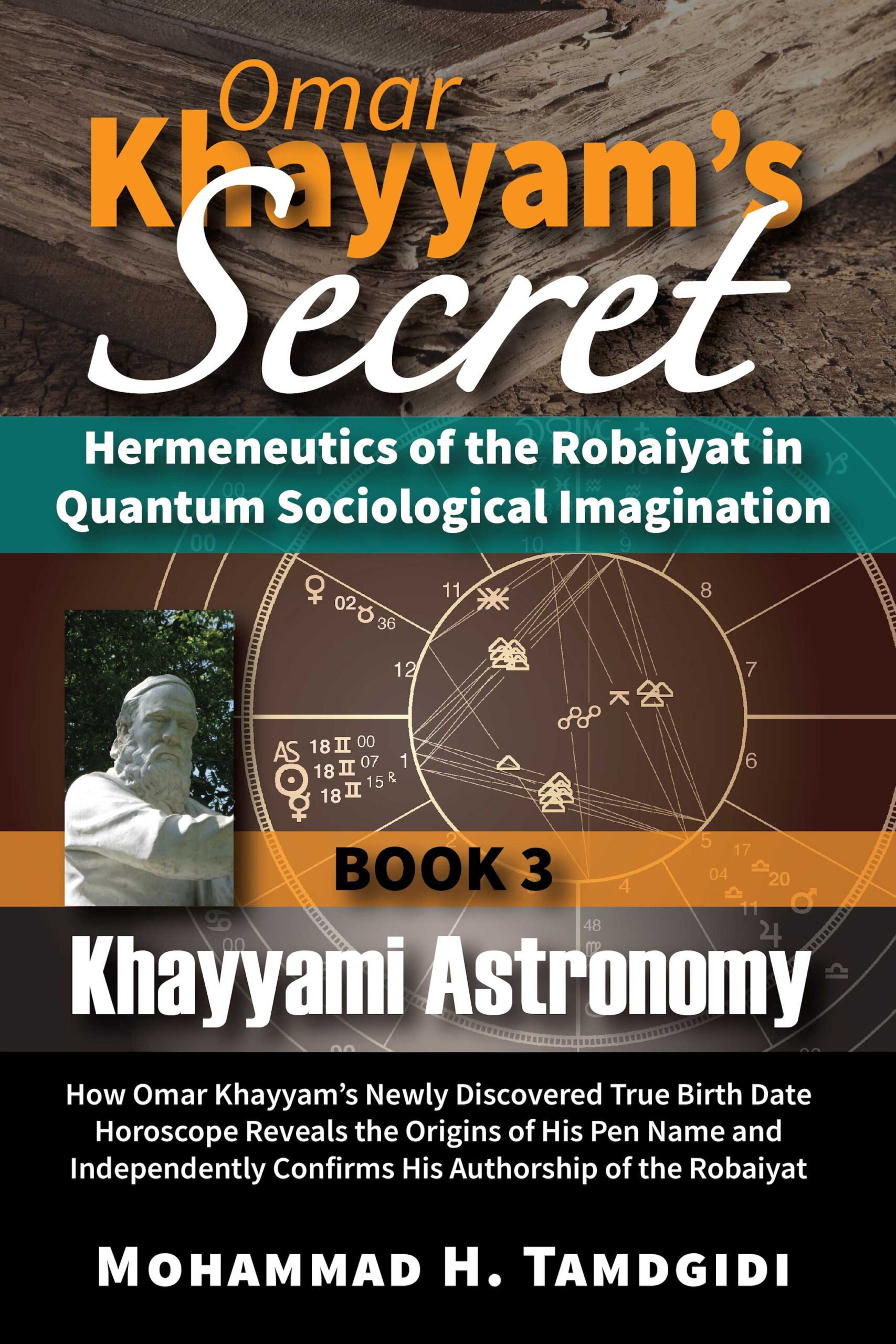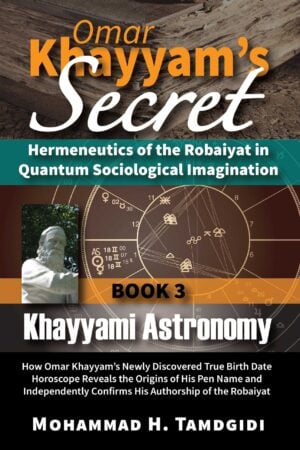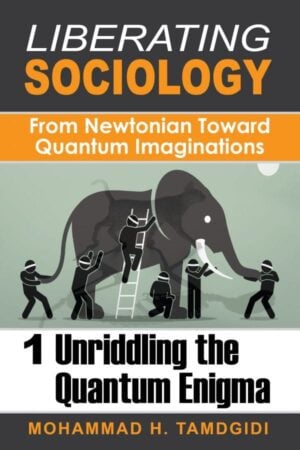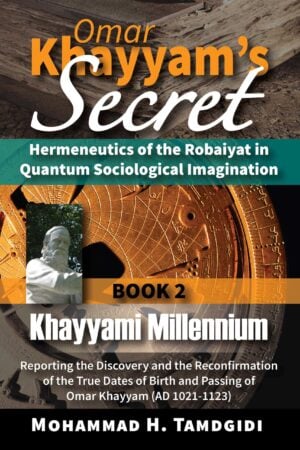Book Section: CHAPTER VIII — Khayyami Astronomy and the ‘Khayyami Code’: Hermeneutically Understanding Omar Khayyam’s Attitude Toward Astrology and His Own Horoscope — by Mohammad H. Tamdgidi
$20.00
This essay, titled “Khayyami Astronomy and the ‘Khayyami Code’: Hermeneutically Understanding Omar Khayyam’s Attitude Toward Astrology and His Own Horoscope,” is the eighth and last chapter of the book Khayyami Astronomy: How the Newly Discovered True Birth Horoscope of Omar Khayyam Reveals the Origins of His Pen Name and Independently Confirms His Authorship of the Robaiyat, which is the third volume of the twelve-book series Omar Khayyam’s Secret: Hermeneutics of the Robaiyat in Quantum Sociological Imagination, authored by Mohammad H. Tamdgidi.
Description
Abstract
This essay, titled “Khayyami Astronomy and the ‘Khayyami Code’: Hermeneutically Understanding Omar Khayyam’s Attitude Toward Astrology and His Own Horoscope,” is the eighth and last chapter of the book Khayyami Astronomy: How the Newly Discovered True Birth Horoscope of Omar Khayyam Reveals the Origins of His Pen Name and Independently Confirms His Authorship of the Robaiyat, which is the third volume of the twelve-book series Omar Khayyam’s Secret: Hermeneutics of the Robaiyat in Quantum Sociological Imagination, authored by Mohammad H. Tamdgidi.
Having learned in the course of research in this series the extent to which Khayyam’s precisely, yet partially, stated horoscope has served to reveal key important details about his life—including his dates of birth, narrowing the margin for his dates of passing, the origins of his pen name and his authorship of the Robaiyat—in this conclusion Tamdgidi notes how he has begun to doubt whether it is at all possible to conduct our Khayyami studies from a hermeneutic point of view, and therefore to understand Khayyam and his works, even and especially the Khayyami Robaiyat, without giving due attention, in fact a central one, to critical astrological insights as a cultural belief-system still prevalent in his time.
For the above reasons, he devotes this chapter to reflecting on the role what he calls “Khayyami astronomy,” which also has critical affinities with astrological belief systems, can play in advancing hermeneutics in Khayyami studies.
In the author’s view it makes sense now to reverse our own point of entry into the study of Khayyam’s horoscope, by considering it possible that Khayyam’s horoscope primarily had in fact an astrological significance, rather than merely intending to simply offer us a clue to Khayyam’s birth date. Even if we consider that one of the functions of sharing the horoscope was to discover a birth date, the latter could be regarded as only a means for discovering a wider birth chart that offered much deeper astrological insights about its native. One can in fact argue that the intention of those who stated birth charts in ancient times was not to offer a back channel, so to speak, to find the native’s birth date. That date was usually assumed to be known, and the chart was meant to offer an astrological story about his or her life to be lived.
In a culture saturated with such valuations of self-identity, even if one himself does not believe in astrology, one interacts with folks who do. So, actions taken, or not, in life become organically interwoven with astrological considerations, such that to understand the motivations behind social actors’ behaviors, one cannot do away with understanding astrology in general, and the actors’ astrological signatures, profiles, and interpretations, in particular. Astrological beliefs in such a culture, in other words, are not immaterial, abstract ideas, but integral factors in the actors’ culturally conditioned self-identities and how they go about making sense of their identities and conduct in everyday life.
It is very important to consider that we are not studying the life and works of just anybody, but one who was himself a major astronomer and expertly trained in the astrological belief systems of his time. So, we are not confronting a challenge here of simply trying to learn about the life and works of someone by “reading his stars.” Rather, we are studying the life and works of someone who himself had to engage with astrological belief systems as part of his efforts in understanding the meaning of his life in broader existential contexts. So, we have here a unique opportunity to learn about him by engaging with astrological belief systems, symbols, and tropes, because he himself seems to be seriously engaging with them, questions about the extent of his actual belief in them withstanding.
So, we should now in fact be asking, given the amount and depth of information a simple few lines of Khayyam’s birth chart have revealed to us, whether his horoscope, one that we can definitively assume he must have formulated himself, was a “Khayyami code” of sorts, a synoptic secret key, a bread crumb, to lead us to learn more about our historical Omar Khayyam.
Astrological belief systems were also a taken-for-granted feature of the culture amid which Khayyam lived, whether or not he believed in the prevalent ways of going about understanding and practicing it. In fact, it may well be the case that he set himself a goal in life of understanding the nature of human existence, and questions about fate and luck and determinism in his own “scientific way” by way of critically engaging with astrology. Whether he succeeded in doing that is beside the point, and in fact both his successes and disappointments in what he found can equally shed light about his life and works.
The point is not to consider either the Eastern astrological imaginations and the Western sociological imaginations as separate endeavors that promise to offer rigid, deterministic causal models of understanding and advancing human action. The point is to consider and integrate them with one another in favor of non-dualistic, and non-deterministic, unpredictable, and creative heuristic conceptual frameworks such that the intimate personal, the broad social, and the cosmic self-knowledges can develop in conversations with one another in favor of holistic and integrative paradigmatic frameworks.
Whether or not such heuristic models are fruitful can be judged not in the abstract, but in the efforts we make in understanding subject matters such as one before us in this still unfolding series regarding the life and works of Omar Khayyam. After all, we may end up discovering that the Khayyami Robaiyat is indeed a work of art in an integrative Easter-Western sociological imagination.
Recommended Citation
Tamdgidi, Mohammad H. 2021. “CHAPTER VIII — Khayyami Astronomy and the ‘Khayyami Code’: Hermeneutically Understanding Omar Khayyam’s Attitude Toward Astrology and His Own Horoscope.” Pp. 297-316 in Omar Khayyam’s Secret: Hermeneutics of the Robaiyat in Quantum Sociological Imagination: Book 3: Khayyami Astronomy: How Omar Khayyam’s Newly Discovered True Birth Date Horoscope Reveals the Origins of His Pen Name and Independently Confirms His Authorship of the Robaiyat. (Human Architecture: Journal of the Sociology of Self-Knowledge: Vol. XVI, 2021. Tayyebeh Series in East-West Research and Translation.) Belmont, MA: Okcir Press.
Where to Purchase Complete Book: The various editions of the volume of which this Book Section is a part can be ordered from the Okcir Store and all major online bookstores worldwide (such as Amazon, Barnes&Noble, Google Play, and others).
Read the Above Publication Online
To read the above publication online, you need to be logged in as an OKCIR Library member with a valid access. In that case just click on the large PDF icon below to access the publication. Make sure you refresh your browser page after logging in.







